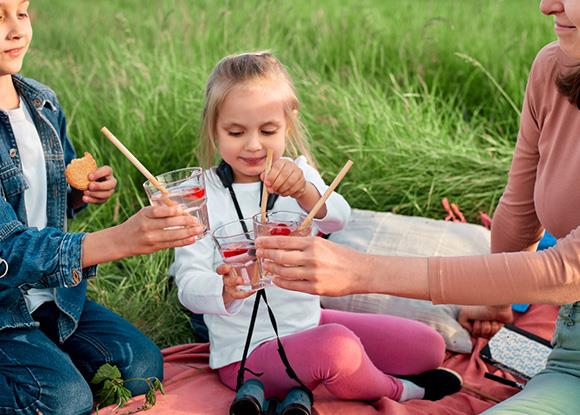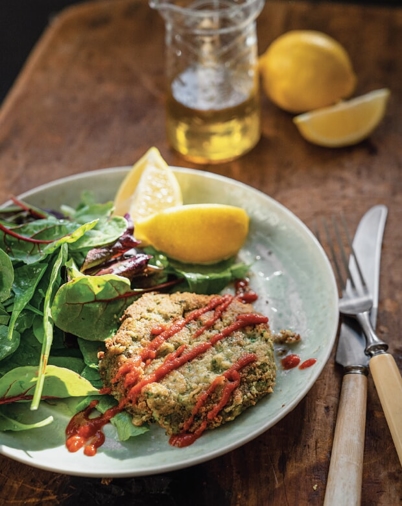Summertime Drinks: 7 You Should Avoid and 3 You Should Embrace
Apr 11, 2023

Chilled and iced drinks help beat the heat. When we are thirsty and hot, the harmful or beneficial elements of each drink seem irrelevant, as long as it quenches our thirst. But knowing the effects of popular summer drinks can help you make the best choice, especially when temperatures soar into the triple digits.
Water is, of course, the best and most natural option for staying hydrated. Sugar and carbohydrates can use up water, so many popular drinks can actually be more harmful than hydrating. Here are some tips to help you make the best choice when quenching your thirst.
Seven popular summer drinks to avoid
We all know that alcoholic drinks are not a healthy choice and cause us to become dehydrated even more quickly. But you may not know these other popular choices also have downsides, especially during warm summer months.
- Soda is notorious for extra calories, carbohydrates, sugar and high fructose corn syrup. These each contribute to weight gain and obesity. Phosphoric acid, commonly used both for rust removal and to flavor some soda drinks, can lead to a loss of calcium in bones. Combined with sugar and acid, it promotes cavities and damages the enamel of your teeth. And if that doesn’t motivate you to skip that giant soda pop, carbonation, acid and sugars actually make you thirstier than you were before.
- Diet soda may sound like a better idea because it has no calories and no real sugar. But studies have shown artificial sweeteners can damage gut bacteria. They change the composition of gut bacteria over time, making diet soda drinkers more glucose intolerant. Glucose intolerance leads to obesity and diabetes — the very things most people drinking diet sodas are trying to avoid.
- Like sodas, energy drinks are full of sweeteners and caffeine. An average 16 ounce energy drink contains caffeine equivalent to about two cups of coffee, and the sweet taste can trick you into drinking more caffeine than you typically would. Overconsumption of energy drinks leads to abnormal heart rhythms, increased blood pressure, seizures, anxiety and mood changes. The sugar in energy drinks can also cause a drop in blood sugar, producing a “crash” rather than an increase in energy.
- Sports drinks and electrolyte replacement drinks can be an option after a long, intense workout in the heat. These drinks contain carbohydrates and salt, which can replace important elements after very strenuous exercise. But unless you are a super-athlete, not enough salt is lost during a workout to require a sports drink, and you will replace those nutrients during your next snack or meal.
- Coffee-based sweet drinks, like a blended frappe are extremely high in calories with at least 400 calories in a 16oz cup. One cup may contain a whole meal’s worth of carbs. It also contains caffeine and saturated fat from milk and cream.
- Lemonade may help your thirst go away because acidic drinks are associated with refreshment. It contains some vitamin C, which may protect against some diseases. But the vitamin C in lemonade is much less than the 1000mg recommended for health benefits. Even worse, many “lemonade” drinks do not contain any actual lemons, but lots of sugar and lemon flavor. Lemonade can also spike up your blood sugar, and the excess carbohydrates will turn into fat if not used throughout the day.
- Juice retains many health benefits and nutrients that come from fresh fruits and veggies. However, healthy fiber is lost in juices, which allows the remaining sugar in the drink to make your blood sugar rise immediately. Eating fresh fruit avoids this problem. Juices usually contain more sugar than we expect, especially the heavily processed store-bought kind.
3 refreshing drinks to embrace
- Iced tea is a less harmful than many other options and can be a good flavorful way to stay cool. However, store-bought iced tea can contain lots of sugar. You can make a delicious iced tea at home and sweeten it to your own taste using natural organic sweeteners, like raw honey. Because caffeine can rob your body of its water, consider choosing an herbal tea for your homemade iced tea.
- Coconut water is an excellent all-natural healthy drink because it is known to lower blood pressure and keep your hydration levels up while also providing nutrition, vitamins and minerals. If you have a heart condition, be sure not to drink excessively as the high levels of potassium in coconut water can be dangerous for your heart rhythm.
- Water, of course, is your best and the healthiest drink option. It is very hard to get too much water on a hot day. If drinking just plain water gets old fast, there are other ways to increase your water consumption and feel refreshed.
Water in fruits and vegetables
Fresh fruits and vegetables are not only an excellent source of vitamins and nutrients but are also a great way to stay hydrated. The food we eat can actually provide 20% of our recommended daily water intake.
Make sure to include a variety of fresh produce in your diet to get all the nutrients and H
- 94 to 96 percent water: cucumber, lettuce, zucchini, celery and tomato.
- 90 to 92 percent water: watermelon, strawberries, grapefruit and cantaloupe.
- 81 to 88 percent water: peaches, blueberries, apples, pears, cherries and grapes.
Making water more fun with infusions
If you want to encourage your family to drink more water, make it exciting by infusing your water with colorful fruits and herbs. Infused water is a tasty way to quench your thirst and can be a healthy boost for your whole body.
To make infused water at home, just slice these ingredients and put them in a big pitcher of clean water. Store it in the fridge for a few hours for a chilled treat. Once the water gets infused with flavor, just drain and enjoy.
Mix and match these ingredients to find refreshing combinations:
- Lemon (vitamin C, promotes alkalinity, cleanses the body) + thyme (lowers blood pressure, disinfects)
- Orange (promotes healthy blood circulation) + lemon + cilantro (promotes cardiovascular strength, strong antioxidant)
- Cucumber (vitamin K, antioxidant, flushes out toxins, freshens breath) + mint (refreshes, supports digestive system, relaxes stomach muscles)
- Lemon + rosemary (boosts immune system, anti-inflammatory, improves digestion)
- Lime (restorative and anti-aging for skin) + ginger (immune system booster) + basil (anti-bacterial)
- Grapefruit (liver detoxifier) + raspberry (anti-inflammatory) + rosemary
- Strawberry (antioxidant) + cucumber + lime + mint
- Kiwi (vitamins C, A, K, B, reduces risks of blood clots) + mint
- Strawberry + basil + cucumber
- Cucumber + lavender (reduces bloating)
Dehydration danger signs
Getting behind on your hydration can go from uncomfortable to dangerous, especially on a really hot day. Remember: If you wait until you feel thirsty to drink water, you're already behind on your hydration needs.
If you think you’re seriously dehydrated — maybe because you’re ill and can’t hold down fluids — call your healthcare provider or visit an urgent care.
If you have severe symptoms, head to the emergency room immediately. Severe symptoms include:
- Passing out
- Bone-dry eyes/mouth
- Inability to take fluids by mouth
